
President Trump is putting pressure on US universities. The elite university Harvard is resisting, but now Washington has threatened to block it from enrolling foreign students. Can Harvard continue to hold out?

Founded in 1636, Harvard University is one of the most prestigious educational institutions in the world. It has produced many Nobel laureates and eight US presidents. However, the current US president, Donald Trump, has declared Harvard “a JOKE” — one he doesn’t find funny. According to Trump, the university teaches “hate and stupidity” and hires “woke, radical left, idiots.” This, he stated in a post on his own social media platform, Truth Social, in mid-April, was why Harvard “should no longer receive federal funds.”
Government agencies immediately froze $2.2 billion (approximately €2.2 billion) that had been earmarked for the university. Then, in May, a government antisemitism task force informed the university leadership that an additional $450 million of funding was also being cut.
On Thursday, May 22, the Trump administration escalated the conflict further. The US Homeland Security Secretary, Kristi Noem, issued a letter revoking the university’s license to enroll foreign students. Harvard was given a 72-hour deadline to provide the administration with specific information about foreign students if it wished to regain its license.

Harvard promptly sued the administration, and scored an initial legal victory the following day when US District Judge Allison D. Burroughs found in the university’s favor. She accepted its argument that the government order would cause Harvard “immediate and irreparable injury,” and temporarily blocked the order pending a further hearing.
What is the Trump administration’s justification for its actions?
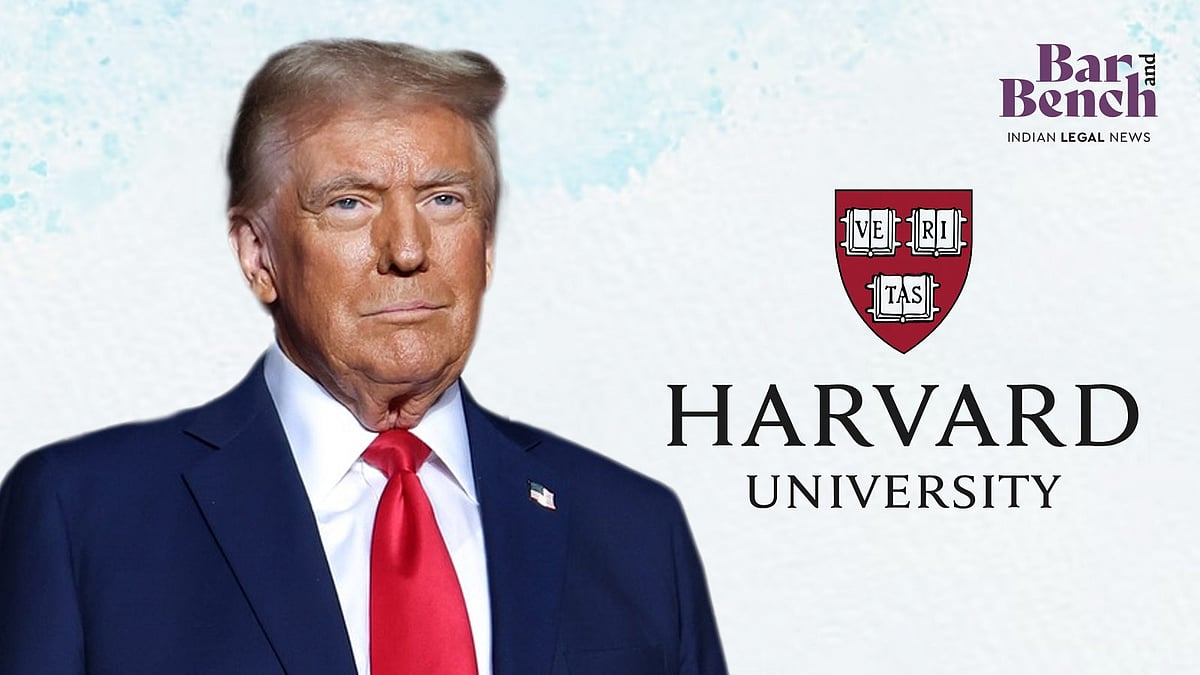
As Trump himself and many of those close to him have repeatedly indicated, they are troubled that, in their eyes, Harvard’s teaching and research are dominated by left-wing content and ideologies. However, the US Constitution makes clear that the government can only restrict freedom of speech in a few, very specific instances. Last month, more than 100 US universities signed an open letter, citing the Constitution, and protesting “unprecedented government overreach and political interference.”
The legal pretext for the funding cuts is the pro-Palestinian demonstrations that have taken place at many US universities as a reaction to Israel’s war against Hamas. The war is Israel’s response to the terrorist attack launched from the Gaza Strip on October 7, 2023. There have been many reports that Jewish students have been targeted in antisemitic attacks during protests in the United States. The US, along with Germany, Israel and other countries, characterize Hamas as a terrorist organization.

Why does the US government have Harvard in its sights?
The new US government has withdrawn funding, or has threatened to do so, from around 60 universities. In March, for example, it pulled $400 million of federal funding from Columbia University in New York, accusing the university leadership of “continued inaction in the face of persistent harassment of Jewish students.”
Columbia sued the administration over the cancellation of funding, but it did comply with several other government demands, such as banning the wearing of masks during protests, hiring new security personnel and making changes to the management of the department of Middle Eastern, South Asian, and African Studies. In spite of this, the US Department of Health and Human Services nonetheless upheld the accusation of inaction.

Harvard, which is located in Cambridge, Massachusetts, a suburb just outside Boston, is so far the only university to openly resist the administration’s demands. Part of the reason why it can afford to challenge the government is that it has an endowment of more than $50 billion. This endowment may now be targeted by the government.
What would the new measures mean for Harvard?
If the administration is successful in blocking Harvard from enrolling international students, one consequence will be that many international students will lose their US residence permits, unless they are able to enroll at a different university.

This would not only deprive Harvard of international talent. There are around 6,800 non-US citizens enrolled at the university, which receives around $400 million per year from them in tuition fees. Fees are the same for US students — around $59,000 per year — but many are awarded scholarships that the university funds. Overall, Harvard therefore earns more from international students than from American ones.
The US government is also considering imposing heavy taxes on capital gains from university endowments. Endowment funds are invested primarily in securities, yielding hundreds of millions of dollars per year. During his first term in office, Trump introduced a capital gains tax of 1.4% for universities with endowments that exceed $500,000 per student. Now, he proposes to add further tiers, and for capital gains on endowments in the highest category — in excess of $2 million per student — to be taxed at 21%.
In the USA Today national newspaper, the economist Phillip Levine estimated that elite universities like Yale, Stanford, MIT, Princeton, and, of course, Harvard, could each face tax bills of between $400 and $850 million a year under the new scheme.
What is the US government demanding of Harvard?
According to a letter sent by three government agencies to the university administration, the US government is demanding that Harvard implement sweeping reforms by August 2025, supposedly in order to counter what it perceives as the dominance of left-wing ideologies at Harvard faculties.

These reforms include introducing new guidelines to limit the “power” of students and faculty, especially those university staff “more committed to activism than scholarship.” Jobs and study places, the letter states, should in future be awarded solely on the basis of merit: The university must “cease all preferences based on race, color, religion, sex, or national origin.” Programs promoting diversity, equity, and inclusion (DEI) are to be discontinued. Furthermore, it says, the reforms will broaden the range of viewpoints represented, and prevent the admission of students’ “hostile” to “American values and institutions.”
It is not clear what will happen next. Judge Burroughs, who temporarily blocked the government order on Friday, has scheduled a hearing for May 29 to decide whether or not the hold should be extended. These are probably just the first steps in what may be a long legal battle.
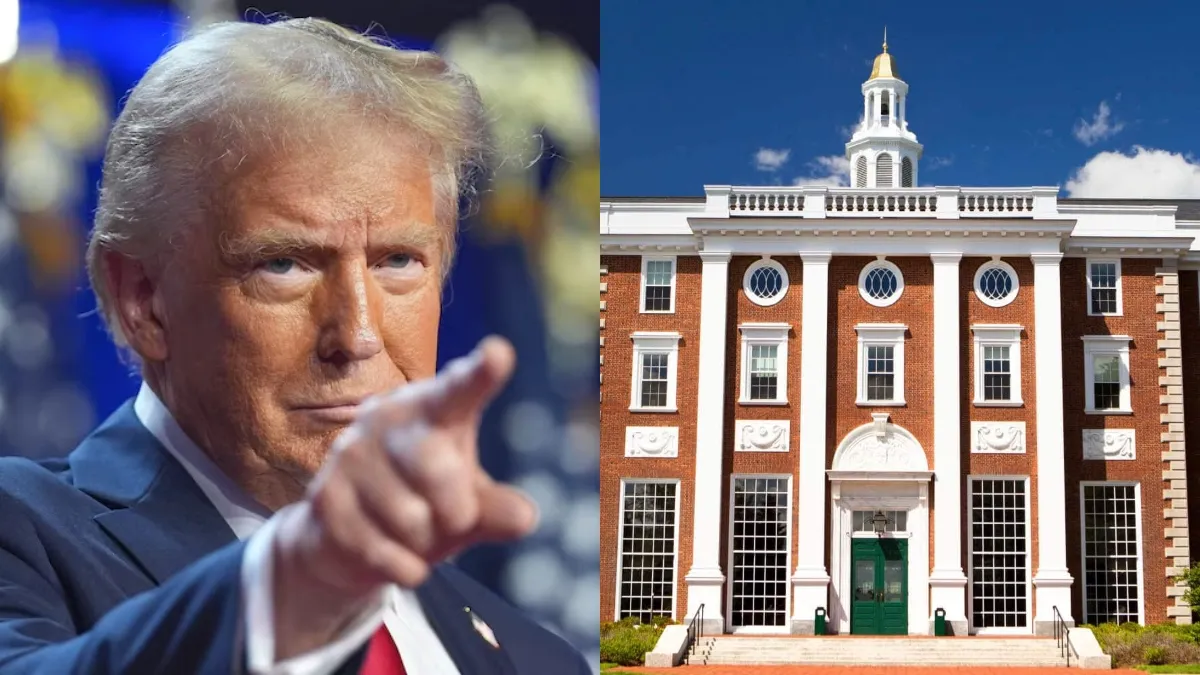
This article has been translated from German.
Trump vs. Harvard: A timeline of the president’s war with the country’s oldest university
Harvard University sued the Trump administration on Friday after having its ability to host foreign students revoked. The move marked the latest escalation in the ongoing back-and-forth between the president and one of the nation’s most prestigious universities.
“We condemn this unlawful and unwarranted action,” Alan M. Garber, Harvard’s president, wrote in a letter released to the public on Friday morning. “It imperils the futures of thousands of students and scholars across Harvard and serves as a warning to countless others at colleges and universities throughout the country who have come to America to pursue their education and fulfill their dreams.”
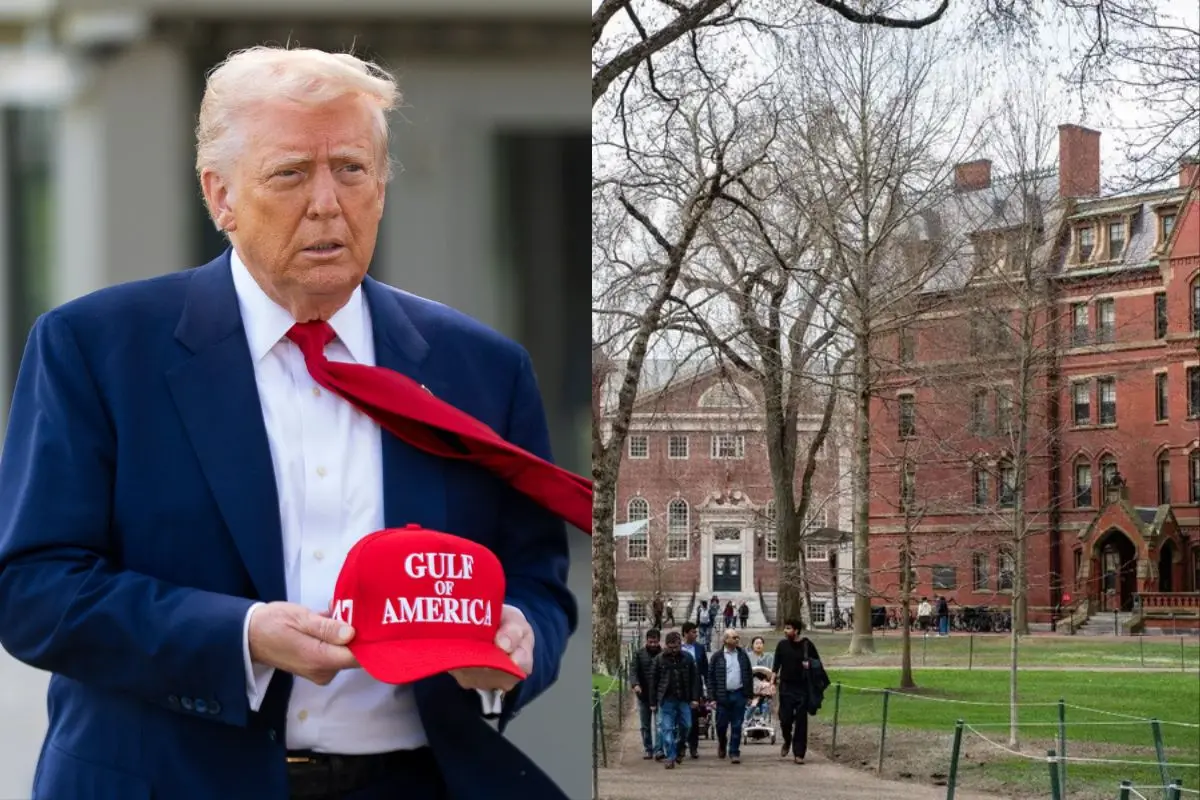
The Department of Homeland Security announced Thursday that it was taking away Harvard’s certification as part of the Student and Exchange Visitor Program, which would block the school from admitting any new international students and force all current foreign students at Harvard to transfer or risk losing their ability to legally remain in the United States.
“This administration is holding Harvard accountable for fostering violence, antisemitism, and coordinating with the Chinese Communist Party on its campus,” DHS Secretary Kristi Noem wrote on social media, citing heavily disputed accusations about how Harvard has handled controversial issues on its campus — particularly protests against Israel’s military campaign in Gaza.

A federal judge temporarily blocked the order from taking effect on Friday morning and scheduled hearings to consider its legality for later this month.
President Trump has mounted a sweeping campaign to impose his ideological worldview on some of the country’s most prominent universities, revoking hundreds of millions of dollars in federal funding from schools like Columbia, Princeton and the University of Pennsylvania. But no college has come under attack in the way that Harvard has.
Over the course of the past few months, America’s oldest university has lost billions in federal grant money, faced demands that it allow the government to dramatically overhaul its operations, been targeted by a cavalcade of investigations and had its tax-exempt status threatened — all before its ability to welcome international students was put at risk.
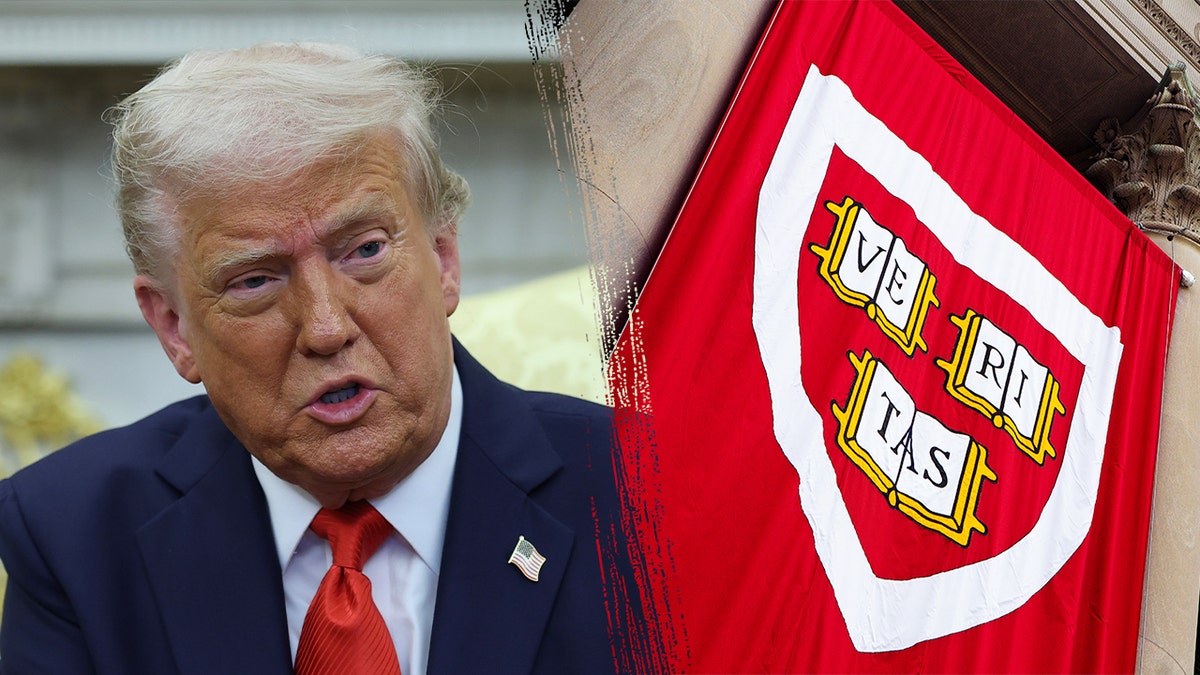
Here’s a timeline of the most aggressive actions the Trump administration has taken against Harvard and how the school has responded.
March 31: The administration’s Joint Task Force to Combat Anti-Semitism announces it will conduct a “comprehensive review” of nearly $9 billion in contracts and grants that Harvard is slated to receive from the federal government over the school’s alleged “failure to protect students on campus from anti-Semitic discrimination.”
April 11: The administration sends Harvard a letter containing a wide-ranging slate of demands, including calling for the school to reform its admissions and hiring policies, end its diversity, equity and inclusion (DEI) practices and grant the government extensive new authority over university operations and education.
April 14: Harvard announces that it is refusing to comply with those demands, insisting that it would not “surrender its independence or relinquish its constitutional rights.” The administration responds by revoking $2.2 billion in federal research grants.
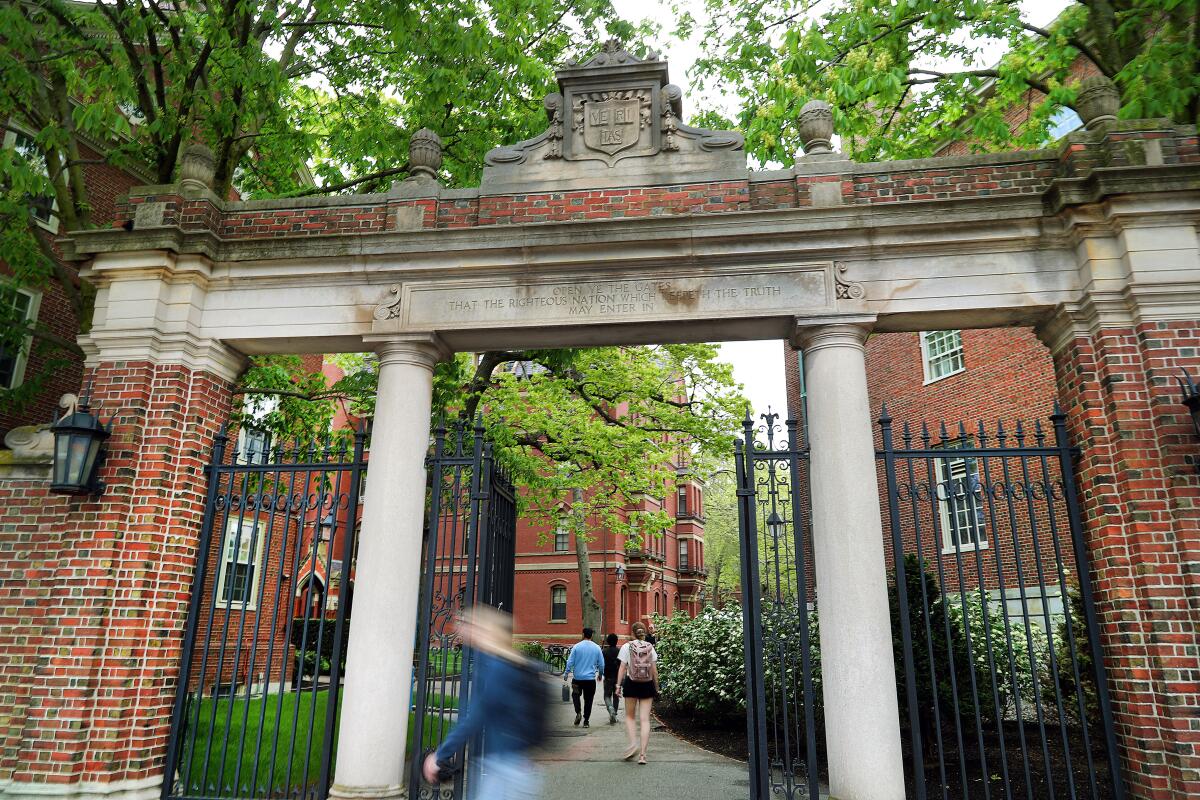
April 16: DHS launches an investigation into Harvard’s international student enrollment, threatens to revoke its ability to host them and demands that the university share comprehensive internal information about each foreign student with the administration.
April 17: The Department of Education announces an investigation into donations Harvard has received from foreign sources, accusing the university of failing to accurately disclose the money it gets from overseas.
April 19: The Department of Health and Human Services announces a comprehensive civil rights investigation into all activities on Harvard’s campus since the Hamas attacks on Israel on Oct. 7, 2023, in order to determine whether the school is violating federal antidiscrimination laws.
April 20: The administration reportedly moves to revoke an additional $1 billion in health research funding for Harvard and its research partners.
April 21: Harvard sues to block the funding freeze. The lawsuit condemns the “broad attack” on the university and argues that the administration broke the law by violating the school’s “academic independence.”
April 25: The Equal Employment Opportunity Commission announces an investigation into Harvard’s hiring practices, accusing the school of discriminating against “white, Asian, male, or straight employees, applicants, and training program participants.”
April 28: The Education Department and HHS announce a joint investigation into allegations of “race-based discrimination” in the operations of the Harvard Law Review.
May 2: Trump says that he is revoking Harvard’s tax-exempt status. It’s unclear whether this will actually happen, however, because federal law explicitly bars presidents from directing the Internal Revenue Service to review or change any taxpayer’s or institution’s tax status.

May 5: The Education Department declares that Harvard is disqualified from receiving any federal grant funding in the future.
May 12: Harvard releases a letter in which it acknowledges “common ground” it shares with the administration and expresses hope that its “partnership” with the government can be restored. That same day, the Justice Department launches an investigation into whether Harvard’s admissions practices violate antidiscrimination laws.
May 13: The administration’s joint task force revokes an additional $450 million in grant funding over claims that Harvard has “repeatedly failed to confront the pervasive race discrimination and anti-Semitic harassment plaguing its campus.”
May 19: Another $60 million in medical research grant funding is canceled by HHS.

May 22: DHS announces that Harvard can no longer host international students.
May 23: Harvard sues to block the order. A federal judge temporarily rules in Harvard’s favor, preventing the order from going into effect for at least two weeks to allow a more thorough legal challenge to get underway.
CNN anchor cut off for ‘breaking news’ announcement in devastating blow to Donald Trump.
CNN anchor Erin Burnett was interrupted on air as she shared a ‘breaking news’ announcement about President Donald Trump and his private crypto currency

CNN’s broadcast was interrupted when Erin Burnett announced “breaking news” about Donald Trump.
The CNN news anchor informed viewers the President would be hosting a gala for the top investors of his cryptocurrency at his private golf club near Washington DC. She started off by saying, “Out-front tonight the breaking news. Trump cashing in on crypto. President Trump, at this moment, is hosting what is being billed as the most exclusive invitation in the world.”
She continued, “Well what is that, you may ask. It is a private dinner for 220 of the biggest backers of Trump’s own private crypto currency. These are investors, many of them from outside the United States. They’ve forked out a lot of money to Trump in order to have the chance for tonight’s face to face with the President of the United States.”
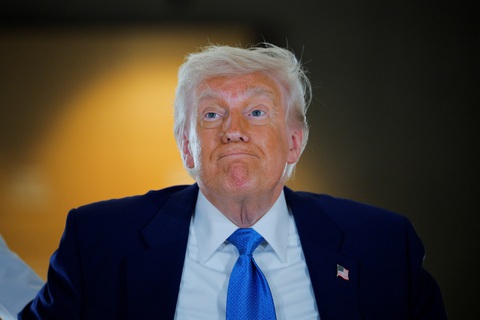
Burnett then examined the website promoting the dinner, likening it more to a product seen on TV than a presidential dinner. The site featured AI-generated images of Trump, register now buttons and an exclusive bonus message reading, “We have separately arranged a special VIP tour for you, so make sure you stay in town.”
Burnett further commented, “A special VIP tour, but to where?” She pointed out that the original exclusive bonus message indicated the tour would be at the White House. This detail was later removed.
The host slammed the President, saying, “The impression of a presidency for sale is bad for America. And now tonight, the White House, maybe no surprise, is quickly trying to shut down the perception that this could have anything to do with Trump profiting off the presidency.”
Footage was then played of Karoline Leavitt, the White House press secretary, stating that Trump was at the dinner on his own time. Burnett asserted, “The President of the United States holding a raffle to the top 25 holders of the meme coin that he is profiting from is not OK because Trump is personally getting money from the transaction fees on his memecoins – at least $1.3 million in fees in the weeks after Trump first announced this dinner, according to a crypto research firm.”
She continued, “Those who forked out millions did so, so that they could meet the President. They could get a direct line to Trump’s ear. That sort of access is priceless.”
Leavitt also claimed Trump has “lost wealth” while mentioning an attempt on his life at a Pennsylvania rally in July. Although Burnett emphasized that the show would “never make light” of an assassination attempt against Trump, she pointed out, “The claim that Trump has ‘lost his wealth’ stands out because it is false.”
CNN asked Dan Alexander, the senior editor at Forbes, about the comments. According to Alexander’s findings, Trump has managed to double his net worth since March 2021, which stood at an estimated $2.4 billion at the end of his first term.
His current net worth is a whopping $5.4 billion, with Bloomberg reporting that the Trump family raked in $1 billion in paper gains from cryptocurrency alone. In a biting critique, Burnett stated, “It certainly sounds like Trump is doing exactly what he accused Hilary Clinton of doing in 2016.”
Donald Trump erupts at reporter in Oval Office and demands he ‘get out’
Donald Trump lost his temper with an NBC reporter in the Oval Office as he hosted South African President Cyril Ramaphosa, demanding he ‘get out’ and branding him a ‘disgrace’

The two leaders began their conversation by celebrating South Africa’s golfers before moving on to a press conference with reporters. He then started showing the South African President images displayed on screen that appeared to show white South Africans mourning their loved ones.
This was carefully prepared ahead of time, according to the BBC. After the footage ended, reporters began asking questions over each other, with Ramaphosa visibly shocked and wanting to respond. Trump then replied to one NBC reporter and told him to “get out.”
He slammed, “What are you talking about? You’ve got to get out of here. What does this have to do with the Qatari jet? We are talking about a lot of other things – this is NBC trying to get off the subject of what you just saw. You’re a terrible reporter. You don’t have what it takes.”
Trump later added, “Go back to your studio at NBC. You ought to be investigated – you’re a disgrace. No more questions from you. His name is Peterson or something. He’s a terrible reporter.”
Prior to the brutal comment from Trump, the atmosphere in the room had reportedly already shifted when Trump sprung an apparent ‘ambush’ on Ramaphosa.
While the video plays, Trump adds commentary and says, “It’s a terrible sight. I’ve never seen anything like it.” Ramaphosa then asks Trump, “Have they told you where that is, Mr. President?” to which he said no
Ramaphosa says he’d like to know where the footage is, as he’s never seen it before, to which Trump said, “It’s in South Africa.”

Following the altercation with the NBC reporter, Trump then held up a stack of papers with images of white South Africans’ faces that the President claims were murdered.
The room then plunges into chaos, with reporters shouting over each other. Ramaphosa responds to the accusations and then steers the conversation to trade. According to the BBC, the South African President said, “South Africa has a democracy that allows people to express themselves.”
“There is criminality in our country,” he added, “and the people who get killed in South Africa are not only white people, but also include black people.”













:max_bytes(150000):strip_icc()/KingCharlesLead-1f8f697676cb4b44bb8a32278ff52bea.jpg?w=1200&resize=1200,0&ssl=1)


















:max_bytes(150000):strip_icc():focal(723x411:725x413)/Frank-Fritz-100224-43e6af9f1eed4fc6b8c825ee4b3d63e4.jpg?w=1200&resize=1200,0&ssl=1)
:max_bytes(150000):strip_icc():focal(749x0:751x2):format(webp)/baby-has-blow-out-on-plane-112025-55a1f3ecc08740058e93b6f2fb2218ff.jpg?w=1200&resize=1200,0&ssl=1)
:max_bytes(150000):strip_icc():focal(754x379:756x381):format(webp)/chow-chow-bowling-green-subway-70ac9e829e20441a978d9f05a1085374.jpg?w=1200&resize=1200,0&ssl=1)
:max_bytes(150000):strip_icc():focal(725x300:727x302):format(webp)/Bridget-Garrison-dogs-tally-karma-01-021926-5f803803830d4771a5d48258b325f341.jpg?w=1200&resize=1200,0&ssl=1)


:max_bytes(150000):strip_icc():focal(749x0:751x2):format(webp)/Dog-missing-in-Colorados-mountains-for-43-days-reunited-with-owner-thanks-to-Summit-Lost-Pet-Rescue-022426-0ebb1d6502764f8eb20d846307727ad0.jpg?w=1200&resize=1200,0&ssl=1)
:max_bytes(150000):strip_icc():focal(743x471:745x473):format(webp)/Abandoned-Dog-at-Airport-022126-d755d65eb323443bade62469ed85c911.jpg?w=1200&resize=1200,0&ssl=1)
:max_bytes(150000):strip_icc():focal(749x0:751x2):format(webp)/rescued-dog-1-030226-b2d2c821a5d74691ba8edd4e8f76508d.jpg?w=1200&resize=1200,0&ssl=1)
:max_bytes(150000):strip_icc():focal(1211x776:1213x778):format(webp)/cats-rescued-22626-91b98a0bd7254a93a6bbf1a223dac5b0.jpg?w=1200&resize=1200,0&ssl=1)
:max_bytes(150000):strip_icc():focal(736x185:738x187):format(webp)/abandoned-puppies-01-021126-de716b3fef81415bb0669b390e8abddd.jpg?w=1200&resize=1200,0&ssl=1)
:max_bytes(150000):strip_icc():focal(749x0:751x2)/Irish-setter-gives-birth-to-record-17-puppies-030326-43c2927d84ed4a59880b16c2c8fdd530.jpg?w=1200&resize=1200,0&ssl=1)





:max_bytes(150000):strip_icc():focal(899x646:901x648)/Tatiana-Schlossberg-Jack-Schlossberg-030126-02-ffbc8841a935444d9a68bdeab3cfe504.jpg?w=1200&resize=1200,0&ssl=1)
